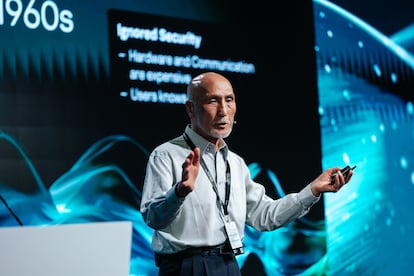Kilnam Chon, computer scientist: ‘AI will be smarter than us in 30 years at most’
Known as the father of the Internet in South Korea, the expert warns of the consequences of AI by comparing humans to monkeys: ‘We can control monkeys, but they can’t control us. If the AI becomes smarter, it will become the human being and we will become the monkey’

Several research studies conclude that artificial intelligence (AI) has already surpassed humans in some tasks. The Artificial Intelligence Index Report 2024, published by Stanford University, claims that this technology is already better at image classification, visual reasoning, and English comprehension. However, for the time being it, lags behind in more complex tasks such as advanced-level mathematics, common-sense visual reasoning, and planning.
In the view of Kilnam Chon, “artificial intelligence will be smarter than us in 10, 20 or, at most, 30 years.” The 81-year-old computer scientist, known as the father of the Internet in South Korea, warns of the consequences of AI by comparing humans to monkeys: “We can control monkeys, but they can’t control us. If the AI becomes smarter, it will become the human being and we will become the monkey. It will control us humans, and not us it.”
If AI is on its way to becoming smarter than humans, should its development be slowed down? Chon recalls that in 2023, there was a proposed moratorium to halt the development of some tools for six months. More than 1,000 entrepreneurs, intellectuals and top researchers involved in this technology signed an open letter urging AI labs to “immediately pause for at least six months the training of AI systems more powerful than GPT-4,” the latest version of the large language model that ChatGPT uses. Now, OpenAI has introduced GPT-4o and is expected to launch its new model, GPT-5, in mid-2024.
“It didn’t work,” says Chon, who underlines that companies continue to develop AI technology in order to “make a fortune.” But then, how can it be guaranteed that AI is a tool for good and not for evil? “Unfortunately, nobody knows,” says the expert in an interview conducted during Kaspersky’s Cyber Immunity conference, an event held in April in Dubai and to which EL PAÍS was invited by the organizing cybersecurity company. The current strategy of several countries and regions, such as Europe, is to regulate artificial intelligence.
Asia’s first Internet
Chon, professor emeritus of the Korea Advanced Institute of Science and Technology, is best known for his contributions to the development of the Internet. He developed the first two Internet nodes in Asia, called the Software Development Network, or SDN, which began operating in 1982. By 1985, it connected some 20 universities, national research labs, and corporate labs in South Korea. Two years later, it was connected to other parts of Asia, such as Australia, Indonesia, Japan, Singapore, Malaysia, and Hong Kong.
Chon, who holds a bachelor’s degree in engineering science from Osaka University in Japan and a PhD in computer science from the University of California, Los Angeles (UCLA), says there was a time when “the Internet was for select people. Until the 1990s, only the elite had access. But once the web was invented, the Internet became accessible to everyone. That’s the world we live in now. We can’t go back to the 1980s anymore.”
In 2012, Chon was inducted into the Internet Hall of Fame, an honorary recognition by the Internet Society for individuals who have made significant contributions to the development and advancement of the web. Upon collecting the award, he posed this question to the audience: “Imagine that when you leave this room, you can’t use the Internet anymore. What would you do?” When asked this again during the interview, the expert laughs out loud: “Are you asking me the same question I asked so many years ago? That’s what I ask students as a teacher.”
He could not leave the room where this interview took place, in the Museum of the Future in Dubai, and do without the Internet, he acknowledges: “It’s unavoidable. You can’t live without it anymore.” He gives as an example the situation in China, which he describes as an extreme case: “You can’t get a ticket or take a cab or buy anything without the Internet. The Chinese don’t use cash anymore. Ask a Chinese person what they would do if the Internet didn’t work. They wouldn’t even be able to give alms to a beggar,” says Chon, who adds that those who beg on the street often carry a QR code with them so they can receive money. This is “the direction we are heading in,” he warns.
Exclusion and insecurity on the Internet
Despite this, 2.6 billion people still did not have access to the Internet in 2023, according to the International Telecommunication Union (ITU). “It may be due to lack of financial resources, living in a remote area, or even having a visual impairment, such as blindness. In these cases, using the Internet is much more difficult.” The computer pioneer considers it unacceptable that part of the population is excluded from the opportunities offered by the web: “The whole world should have access, not just part of it.”
Still, Chon has one concern about Internet use: security, and in particular ransomware, the malicious software that locks a victim’s data or device and threatens to keep it locked. “They force you to pay a huge amount of money, millions of dollars, or else you can’t use a hospital’s systems or other critical systems. It’s terrible and we don’t know how to control it,” he says.
Despite multiple experts trying to make the internet a safe place, Chon warns that cybercriminals always find a way in: “Unfortunately, we are not winning.” Various cybersecurity companies use AI to detect malware. But cybercriminals also use it for their own purposes. With AI, the threats from attackers “will be much greater. They might get smarter. We might have to beg them: ‘Please can you help us?’” he predicts.
Sign up for our weekly newsletter to get more English-language news coverage from EL PAÍS USA Edition
Tu suscripción se está usando en otro dispositivo
¿Quieres añadir otro usuario a tu suscripción?
Si continúas leyendo en este dispositivo, no se podrá leer en el otro.
FlechaTu suscripción se está usando en otro dispositivo y solo puedes acceder a EL PAÍS desde un dispositivo a la vez.
Si quieres compartir tu cuenta, cambia tu suscripción a la modalidad Premium, así podrás añadir otro usuario. Cada uno accederá con su propia cuenta de email, lo que os permitirá personalizar vuestra experiencia en EL PAÍS.
¿Tienes una suscripción de empresa? Accede aquí para contratar más cuentas.
En el caso de no saber quién está usando tu cuenta, te recomendamos cambiar tu contraseña aquí.
Si decides continuar compartiendo tu cuenta, este mensaje se mostrará en tu dispositivo y en el de la otra persona que está usando tu cuenta de forma indefinida, afectando a tu experiencia de lectura. Puedes consultar aquí los términos y condiciones de la suscripción digital.









































